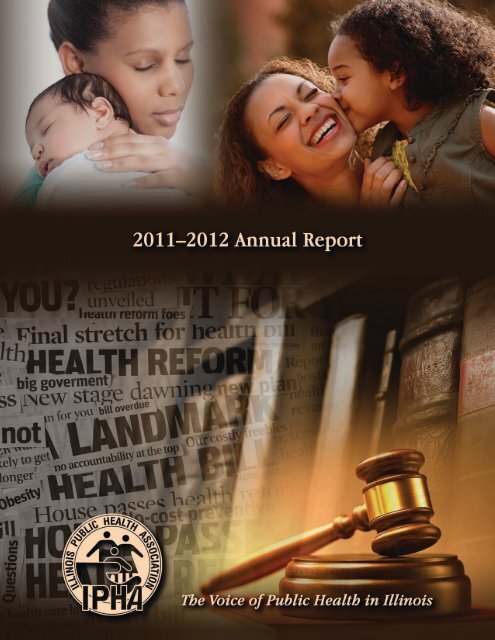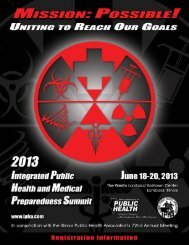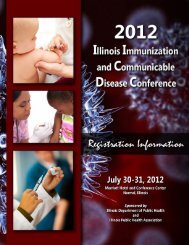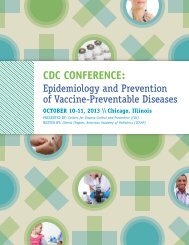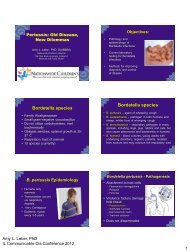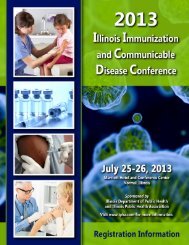IPHA 2011-2012 Annual Report - Illinois Public Health Association
IPHA 2011-2012 Annual Report - Illinois Public Health Association
IPHA 2011-2012 Annual Report - Illinois Public Health Association
- No tags were found...
Create successful ePaper yourself
Turn your PDF publications into a flip-book with our unique Google optimized e-Paper software.
<strong>Illinois</strong> <strong>Public</strong> <strong>Health</strong> <strong>Association</strong><strong>2011</strong>–<strong>2012</strong> <strong>Annual</strong> <strong>Report</strong>The <strong>Illinois</strong> <strong>Public</strong> <strong>Health</strong> <strong>Association</strong>, an affiliateof the American <strong>Public</strong> <strong>Health</strong> <strong>Association</strong>,is <strong>Illinois</strong>’ oldest and largest voluntary organizationdevoted exclusively to matters of public health.Our Mission is to lead and advancepublic health practice in <strong>Illinois</strong>.Contact us atwww.ipha.com217.522.5687<strong>Illinois</strong> <strong>Public</strong> <strong>Health</strong> <strong>Association</strong>The Voice of <strong>Public</strong> <strong>Health</strong> in <strong>Illinois</strong>
President’s Message“The work ofpublic health and<strong>IPHA</strong> has alwaysbeen challenging.Together we haveworked smarteron defining ameasurable set ofstrategies and goalsfor ourselves.”See what we are doing together...It is a privilege to introduce the <strong>Illinois</strong> <strong>Public</strong> <strong>Health</strong> <strong>Association</strong>’s <strong>2012</strong> <strong>Annual</strong><strong>Report</strong>. The <strong>Association</strong> has had a busy and productive year fostered by aninsightful and committed executive leadership and resourceful staff. The culture ofan organization is defined more by the actions taken and what’s being done thanby what is being said and discussed. I would suggest by either measure we’ve hada successful year in pursuit of implementing <strong>IPHA</strong>’s strategic plan (2010-2015) andmission to lead and advance public health practice in <strong>Illinois</strong>. This strategic planfocuses on four strategies: 1) Build the capacity of <strong>Illinois</strong>’ public health system;2) Pursue effective public health policy change; 3) Increase involvement ofmembership; and 4) Growth in a public health culture that is more assertive.<strong>IPHA</strong>’s top priority over the past year has been the urgent initiative to consolidatethe currently scattered maternal and child health services under the leadership ofthe <strong>Illinois</strong> Department of <strong>Public</strong> <strong>Health</strong> (IDPH). This effort has engaged all of thestrategies established in the strategic plan and has united the public health practicecommunity in <strong>Illinois</strong> behind reintegrating maternal, infant and early childhoodprogramming with other essential public health services, including communicabledisease, chronic disease management and environmental health interventions.This was boldly undertaken realizing full well the challenge that it represents, butis more than balanced by the public health benefit of improved outcomes in thehealth of our children. This effort thus far has involved the development of a broadlydistributed whitepaper, the development of comprehensive legislation (HB5363),meetings with the Governor’s staff, the Secretary of IDHS and the Director of IDPHand an appointment to and service on the Human Services Commission developingrecommendations on rationalizing the service delivery system.This has also been an aggressive year in the pursuit of grant support for publichealth practice needs. This includes <strong>IPHA</strong> support and partnership work withIDPH and local health departments (LHDs) in preparation of a competitive grantproposal to CDC that ultimately lead to the We Choose <strong>Health</strong> Community TransformationGrant bringing $4.5 million per year over the next five years to supportchronic disease interventions at the community level through IDPH. Anothersuccessful funding initiative ($450,000 over two years) was an <strong>IPHA</strong> application toCDC to develop the capacity for third-party billing and reimbursement in supportof LHDs currently without such capacity. And finally, while a funding decisionis still pending, <strong>IPHA</strong>’s Maternal and Child <strong>Health</strong> (MCH) section convened aworkgroup and successfully completed an application for funding for the StrongStart Coalition to reduce preterm births through closer collaboration between MCHhome visiting, support services and primary care providers at the community level.The work of public health and <strong>IPHA</strong> has always been challenging. Together we haveworked smarter on defining a measurable set of strategies and goals for ourselves.With an action-oriented staff, a “can do” attitude and a membership committed tomaking a difference, <strong>IPHA</strong> is striving to create an improved 21st Century public healthsystem capable of greater levels of health improvement for individuals, familiesand communities across <strong>Illinois</strong>. See what we are doing together.4J. Maichle Bacon, MPHPresident, <strong>IPHA</strong>
Executive Director’s Message“State level leadershipin <strong>Public</strong><strong>Health</strong> has beencentral to theinterests of themembers at everylevel and hassubstantiallycontributed to thestrength of <strong>IPHA</strong> onall policy mattersof the <strong>Association</strong>.”It is undeniable that throughout the history of the <strong>Illinois</strong> <strong>Public</strong> <strong>Health</strong> <strong>Association</strong>,the State Director and senior level staff of the <strong>Illinois</strong> Department of <strong>Public</strong> <strong>Health</strong>have been fundamental to the success and growth of the <strong>Association</strong>. State levelleadership in <strong>Public</strong> <strong>Health</strong> has been central to the interests of the members atevery level and has substantially contributed to the strength of <strong>IPHA</strong> on all policymatters of the <strong>Association</strong>. During the early years of the <strong>Association</strong>, at a timewith far fewer local health departments than exist today, much of the leadershipin the <strong>Association</strong> was represented by public health professionals within the statehealth department. A glimpse at the list of past presidents and officers of <strong>IPHA</strong>clearly points to that history and the positive impact that the relationship has hadon <strong>IPHA</strong>. The current leadership of the <strong>Association</strong> affirms the belief that thispartnership is crucial to the success of the <strong>Association</strong>’s goals as framed by ourfive year Strategic Plan, our Resolutions and the <strong>IPHA</strong> Mission.During the period of this report, the <strong>Association</strong> entered into an important dialogueand policy discussion regarding state-level leadership in public health. This discussionwas initiated to support the core belief that within the senior levels of statepublic health leadership both academic preparation and experience in public healthare essential. The discussion resulted in a valuable and sensibly drafted PolicyResolution which was passed by the membership at the 71st <strong>Annual</strong> Meeting. Thisdiscussion was initiated at a time of change in leadership within the administrationand during a long search to fill the position of State Director of <strong>Public</strong> <strong>Health</strong>. Thispast March, the leaders and members of <strong>IPHA</strong> were delighted when Dr. LaMarHasbrouck, M.D., M.P.H., was selected by Governor Quinn as <strong>Illinois</strong>’ new chiefstate health officer. Dr. Hasbrouck exemplifies the training and experiential qualitiesoutlined in the <strong>IPHA</strong> Resolution and we congratulate the Governor and hisstaff for the diligent work in bringing him to this position. On May 27, <strong>2012</strong>, <strong>IPHA</strong>was pleased to host a welcome reception for Dr. Hasbrouck and his family at theGovernor’s mansion. The event was attended by the department’s senior staff,other Executive Branch Directors and leaders, members of the General Assemblyand Members from several <strong>IPHA</strong> Affiliates. During the reception, President MikeBacon articulated the distinguishing characteristics that Dr. Hasbrouck brings tothe position of State <strong>Health</strong> Director, and how he so perfectly meets the criteria that<strong>IPHA</strong> used while advocating for legislation requiring a more comprehensive view of<strong>Illinois</strong> State <strong>Health</strong> Director qualifications. We were pleased when Governor Quinnconcurred with the broadening of the qualifications by requiring both academictraining in a health related discipline as well as public health experience. Thisis an important change for all who believe that those selected for public healthleadership can emanate from a broad array of public health, allied health science,management, or medical training, coupled with requisite public health leadershipexperience. This past year, <strong>IPHA</strong> did the right thing by addressing this issue as animportant public health policy, vetting it within the public health community, passingthe Resolution, and subsequently supporting the statutory change for State <strong>Health</strong>Director qualifications criteria. Dr. Hasbrouck is a perfect fit to these criteria and wewelcome him as a member of <strong>IPHA</strong> and as a partner in pursuit of the <strong>IPHA</strong> mission“to lead and advance public health practice in <strong>Illinois</strong>.”James R. Nelson, MSExecutive Director5
Maternal and Child <strong>Health</strong>Strong Start6www.ipha.com<strong>IPHA</strong>’s Maternal and Child <strong>Health</strong> (MCH) Sectionworked with many state and local agencies and organizationsto develop a proposal to the federal Centerfor Medicare and Medicaid Services for a Strong Startfor Mothers and Newborns cooperative agreement.The proposal requested $20.5 million for a four-yearproject to test the effectiveness of two models of“enhanced” prenatal care, Centering Pregnancyand Maternity Care Homes, in reducing the rate ofpre-term birth among Medicaid-eligible women.A core group of Maternal and Child <strong>Health</strong> expertsled the development of the proposal, includingKaren Ayala, chairperson of the Maternal and Child<strong>Health</strong> Section; Janine Lewis, Executive Director ofthe <strong>Illinois</strong> Maternal and Child <strong>Health</strong> Coalition; Drs.Arden Handler and Deborah Rosenberg of the UICSchool of <strong>Public</strong> <strong>Health</strong>; Dr. Susan Vonderheid ofthe UIC College of Nursing; Glendean Sisk and JoAnne Durkee of the <strong>Illinois</strong> Department of HumanServices; Mike Jones, Linda Wheal, Julie Doetsch,Gwen Smith, and Alicia Hawkins of the <strong>Illinois</strong>Department of <strong>Health</strong>care and Family Services;Mary Driscoll of the <strong>Illinois</strong> Department of <strong>Public</strong><strong>Health</strong>; and Amy Sagen and Jennifer McGowan ofthe Governor’s Office. This group met on a weeklybasis from February through June to lead thedevelopment of <strong>Illinois</strong>’ proposal.The leadership team organized three work groups:one for Centering Pregnancy, led by Dr. Vonderheid;one for MCH, led by Ms. Lewis, and one onData, Evaluation and Information Technology ledby <strong>IPHA</strong> and Dr. Rosenberg. The work groups metfrom March through May. The Governor’s Officeof <strong>Health</strong> Information Technology also providedinvaluable support in the design of the datacollection system. The local agencies that will beimplementing each model for Strong Start wereactive participants in their respective groups.The participating service providers are: AccessCommunity <strong>Health</strong> Network, Advocate <strong>Illinois</strong> MasonicMedical Center, Aunt Martha’s Youth Service Center,Chicago Family <strong>Health</strong> Center, Circle Family <strong>Health</strong>-Care Network, Cook County <strong>Health</strong> and HospitalsSystem, DuPage County <strong>Health</strong> Department, ErieFamily <strong>Health</strong> Center, Greater Elgin Family CareCenter, Lawndale Christian <strong>Health</strong> Center, McLeanCounty <strong>Health</strong> Department, PCC CommunityWellness Center, Rockford <strong>Health</strong> Physicians, St.Clair County <strong>Health</strong> Department, SangamonCounty Department of <strong>Public</strong> <strong>Health</strong>, Southern <strong>Illinois</strong><strong>Health</strong>care Foundation, Stephenson County <strong>Health</strong>Department, Swedish Covenant Medical Group,Tazewell County <strong>Health</strong> Department, VNA <strong>Health</strong>, andWinnebago County <strong>Health</strong> Department.Altogether, 95 people representing 48 organizationsparticipated in at least one conference call. All ofthese partners comprise <strong>Illinois</strong>’ Strong Start Coalition.<strong>Illinois</strong> averages about 177,500 live births annually.Just over 89,000, or half, of those births are financedby <strong>Illinois</strong>’ Medicaid program. “Non-normal deliveries”(low or very low birth weight infants, fetal deathsand other conditions) accounted for 39% of birthsto Medicaid-eligible women and 98% of Medicaidexpenditures for prenatal care and delivery in StateFiscal Year 2009. In particular, very-low birth weightinfants represent 1.3% of births to Medicaid-eligiblewomen and 59% of Medicaid expenditures forprenatal care and delivery. (i) Reducing the rate ofpreterm birth is imperative for improving infant healthand reducing Medicaid spending.Centering Pregnancy (CP) is an innovativeevidence-based model of group prenatal care thathas been implemented in over 300 sites nationwide.CP provides health assessment, educationand support in a group facilitated by a credentialedprenatal care provider (physician or advancedpractice nurse) and a co-facilitator, usually a nurseor health educator. After an initial individual prenatalvisit including risk assessment, a group of 8-12pregnant women with similar expected deliverydates meet for 10 group visits. During the first 30minutes, women have a brief individual assessmentwith the care provider, participate in self-careactivities, complete a Self-Assessment Sheet onthat session’s topic to facilitate later discussion,enjoy refreshments, and socialize. When the group“circles up” together for the remaining 90 minutes,there is facilitated discussion about health topicsand the exchange of wisdom on shared healthexperiences. Each session has an overall planwith “core” health promotion content geared to thestage of pregnancy of each visit, including issuessuch as smoking, substance use and depression.Any concerns women express are also discussed.Groups are lively, interactive, and patient-centered.Multiple learning formats include discussion,activities (e.g., games, word puzzles), and invitedresource persons (e.g., nutritionist) who share theirexpertise. The group context, including substantiallyincreased time for health promotion, self-care,a collaborative client-provider relationship andincreased social support from the facilitators andthe group, is CP’s unique approach. We plan toserve 7,000 women through this model.(i) <strong>Illinois</strong> Department of <strong>Health</strong>care and Family Services. <strong>2012</strong>. <strong>Report</strong> to the General Assembly(for) <strong>Public</strong> Act 93-0536. Springfield, <strong>Illinois</strong>: Author. Pages 15 – 20 and Chart 34 on page 43.
The Transforming Maternity Care Partnership (ii)identifies four key elements of a Maternity CareHome: continuity of care from a primary clinicianwho accepts responsibility for providingand/or coordinating all health care and relatedsocial services during a woman’s pregnancy,childbirth, and postpartum period; commitment tocontinuous quality improvement, patient safety, andevidence-based practice; commitment to womancenterednessand a positive experience of care;and timely access to appropriate care and information.These elements have been put into practicein <strong>Illinois</strong> for many years, though not always in onesetting. The <strong>Illinois</strong> Department of <strong>Health</strong>care andFamily Services’ designation of a “Maternal andChild <strong>Health</strong> Provider” is identical with many of theclinical characteristics of the Maternity Care Home.Community-based care coordination is a commonfeature of <strong>Illinois</strong>’ Family Case Management,Targeted Intensive Prenatal Case Managementand <strong>Health</strong>y Start programs. <strong>Illinois</strong>’ proposal willbring these elements together by placing a carecoordinator within a prenatal care practice thatmeets the requirements for a “Maternal and Child<strong>Health</strong> Provider.” The care coordinator will functionas a member of the health care team and facilitatecommunication among patients and communityservice providers. The functions performed by thecare coordinator will include enrollment in StrongStart and in Medicaid or CHIP; assessment ofservice needs; development of an individualizedplan of care with the patient and family members;referral of patients for additional health careservices and community health and social services(especially WIC, smoking cessation, substanceabuse treatment, behavioral health care and oralhealth care); follow-up with patients to ensure(ii) Romano, A. What Is a Maternity Care Home? Transforming Maternity Care. http://transform.childbirthconnection.org/<strong>2012</strong>/03/what-is-a-maternity-care-home/. Accessed August 29, <strong>2012</strong>.that they have been able to access services andassistance in “navigating” the health and humanservices system; coaching patients and advocatingfor them with health care and human service providers;providing health education in a culturally andlinguistically competent manner; providing psychosocialsupport to patients; preparing patients forappointments; anticipating and discussing patients’needs with other members of the health care team;building relationships with community serviceproviders; and collecting data to document carecoordination activities. We plan to serve 13,700women through this model.The data collection and analysis system developedby the partners is one of the strengths of <strong>Illinois</strong>’proposal. Data on program participants will be fedto a central database created by Medical ResearchAnalytics and Informatics Alliance at StrogerHospital, a CDC-funded Prevention EpiCenter andhost of <strong>Illinois</strong>’ “public health node.” Data will bedrawn from the <strong>Illinois</strong> Department of <strong>Health</strong>careand Family Services’ Medicaid Enterprise DataWarehouse, which includes matched Medicaid,vital records and hospital discharge data; the <strong>Illinois</strong>Department of Human Services’ Cornerstonesystem; local clinics’ electronic medical recordssystems and specialized program data collection.We used a unique approach to financing proposaldevelopment. Funds were provided by <strong>IPHA</strong>, the<strong>Illinois</strong> Maternal and Child <strong>Health</strong> Coalition, TheChicago Community Trust, The Lloyd A. Fry Foundationand The Polk Brothers Foundation. The proposalwas written by Ralph Schubert, owner of TakeIt For Granted LLC, through a contract with <strong>IPHA</strong>.Interested parties may obtain a copy of the Coalition’sproposal by contacting <strong>IPHA</strong> at (217) 522-5687.<strong>2011</strong>-<strong>2012</strong> <strong>IPHA</strong> <strong>Annual</strong> <strong>Report</strong> 7Programs & Partnerships
Programs & Partnerships<strong>Health</strong> Education /Promotion SectionThe <strong>IPHA</strong> <strong>Health</strong> Education/Promotion Sectionsponsored its first stand-alone workforce trainingin January <strong>2012</strong> entitled “Boost Your Message:Social Media in a <strong>Public</strong> <strong>Health</strong> World.” The event,co-sponsored by SIU School of Medicine and the<strong>Illinois</strong> Society of <strong>Public</strong> <strong>Health</strong> Educators, washeld at Memorial Medical Center in Springfield.The purpose of the training was to provide participantswith an overview of social media channelsand tools (including Facebook, Twitter, mobile,and more) and applications to public healthcommunications and marketing. The training alsoprovided participants with the skills needed tobegin developing a basic social media strategy forhealth promotion and prevention messaging. Fourpanel presentations were given, which includedthe following:The Effect of a Social Media Intervention on RiskySexual Behavior and Chlamydia and IncidenceKrista Jones, clinical instructor of health systemssciences, University of Chicago School of NursingThe Confluence of <strong>Public</strong> <strong>Health</strong> and SocialMediaMichael Shmarak, Vice President, DKC <strong>Public</strong>Relations, Marketing & Government AffairsSocial Media and Sexual <strong>Health</strong>Jeffery Erdman, HIV Programs Manager, <strong>Illinois</strong><strong>Public</strong> <strong>Health</strong> <strong>Association</strong>STD Text Messaging CampaignRandy McClellan, <strong>Health</strong> Protection ServicesCoordinator, Peoria City/County <strong>Health</strong> Department.In response to thepositive feedback fromthe January <strong>2012</strong>training, the <strong>Health</strong>Education/PromotionSection planned anothersocial media training inNovember <strong>2012</strong> in thenorthern region. Thissubsequent training hada broader public healthfocus, with an emphasison the Patient Protectionand Affordable Care Actand social media’s rolein educating the publicabout the benefits andprovisions.<strong>Public</strong> <strong>Health</strong> NursingSectionOn March 5, <strong>2012</strong>, three new Nursing Sectionleaders met for the first time. They includeStephanie Standish, Section Chair; Julie Babyar,Section Secretary, and Tracey Smith, SectionRepresentative. A plan to revitalize the <strong>Public</strong> <strong>Health</strong>Nursing Section was developed at this meeting.This revitalization started with the co-hostingof a HPV Section Summit at the <strong>IPHA</strong> 71st<strong>Annual</strong> Meeting and Legislative Action Day heldon April 17, <strong>2012</strong>, with the Maternal and Child<strong>Health</strong> Section. The new leaders also hosted an<strong>IPHA</strong> Nursing Section breakfast roundtable atthe <strong>Annual</strong> Meeting on April 18th. Five nursesattended this meeting and further plans torevitalize the <strong>Public</strong> <strong>Health</strong> Nursing Section weredeveloped.The Nursing Section is currently holding monthlyconference calls to plan an <strong>IPHA</strong> <strong>Public</strong> <strong>Health</strong>Nursing Conference to be held early 2013. Watchfor the quarterly newsletter that the <strong>Public</strong> <strong>Health</strong>Nursing Section will soon be releasing to keep youup to date on this section.8www.ipha.com
Center for ContinuingEducation andWorkforce DevelopmentThe Center for Continuing Education and WorkforceDevelopment (CCEWD) continued its successduring Fiscal Year <strong>2012</strong>. The Center serves as apremier entity for conference coordination servicesand fiscal management for government agencies,state associations and other organizations addressingpublic health issues. During the year, CCEWDprovided staffing, registration, fiscal managementand/or continuing education credits for 10 trainingsand conferences for eight different groups includingthe <strong>Illinois</strong> Department of <strong>Public</strong> <strong>Health</strong> Food,Drugs & Dairy, Minority <strong>Health</strong>, HIV, and Women’s<strong>Health</strong> Divisions. The fiscal year began with theImmunization Conference held at the Marriott Hotelin Normal. This conference was co-sponsored by<strong>IPHA</strong> and IDPH. Over 300 individualsattended educational sessions focusingon hepatitis, TB, vaccinations, and foodbourneillnesses. In September <strong>2011</strong>,the <strong>2011</strong> Food Safety Symposium washeld in Peoria at the Pere MarquetteHotel. The theme for the conferencewas Eat Right, Eat Smart, Eat Safe. Theevent had over 200 attendees. October<strong>2011</strong> brought the 20th <strong>Annual</strong> HIV andSTD Conference to Springfield. Incelebration of the 20th anniversary ofthe conference, educational sessionsfocused on past accomplishments in the treatmentand prevention of HIV/AIDS, and where the movementwould be heading in the future. Over 400health professionals attended the conference at theHilton Hotel. The Women’s <strong>Health</strong> Conference washeld in Springfield in November <strong>2011</strong>. Educationalsessions focused on cardiovascular disease, obesity,managing stress, and chronic disease prevention.<strong>IPHA</strong> held its 71st <strong>Annual</strong> Meeting and LegislativeDay in Springfield in April <strong>2012</strong>. Keynote speakersfor this event included Jim Duffett, Sherry Prowda,Robyn Gabel, Alderman Cory Jobe, and ComptrollerJudy Baar Topinka. Also in April, <strong>IPHA</strong> worked withIDPH to host the first annual Minority <strong>Health</strong> Conferenceat the Marriott in Naperville. Nearly 300 attendeeswere present at the two day conference, whichhosted sessions focusing on Eliminating <strong>Health</strong>Disparities Through Community Transformation. InJune, <strong>IPHA</strong> and IDPH partnered once again on theIntegrated <strong>Public</strong> <strong>Health</strong> and Medical PreparednessSummit (formally known as PHEP) in Lombard.Nearly 800 emergency preparedness, public health,and medical personnel attended this conference,which highlighted perennial favorite, General RusselL. Honore (ret.) as one of its keynote speakers.In addition to the conference planning and fiscalmanagement, CCEWD staff also handled theadministration of the <strong>IPHA</strong> AmeriCorps Program.Early August marked the end of the ninth successfulyear of the AmeriCorps Program with twentyfourfulltime members and 3 summer memberscompleting the program. Throughout the yearmembers participated in health promotionand education, and emergencypreparedness planning for local healthagencies in <strong>Illinois</strong>. The <strong>2011</strong>-12program year had seventeen agenciesserve as host sites for the members.In addition to the important work thatAmeriCorps members provided to theirhealth agency work sites, they alsoparticipated in a variety of local communityservice projects. These projectsincluded: promoting healthy livingtips to people in their communities for National<strong>Public</strong> <strong>Health</strong> Week; assembling flood buckets forcommunities in the United States affected by floods;cleaning up litter in a Springfield park area; and,building wheelchair accessible ramps and docks ata campground for disabled individuals near Peoria.<strong>2011</strong>-<strong>2012</strong> <strong>IPHA</strong> <strong>Annual</strong> <strong>Report</strong> 9Programs & Partnerships
<strong>IPHA</strong> 71st <strong>Annual</strong> Meeting<strong>Illinois</strong> ComptrollerJudy Baar-TopinkaWorking Together for <strong>Public</strong> <strong>Health</strong> Policy<strong>IPHA</strong>’s 71st <strong>Annual</strong> Meetingand Legislative Action DayWorking to raise public health’s profile continuesto be an important element of <strong>IPHA</strong>’s <strong>Annual</strong>Meeting and Legislative Action Day. The 71st<strong>Annual</strong> Meeting “Working Together for <strong>Public</strong><strong>Health</strong> Policy” was undertaken in collaborationwith the <strong>Illinois</strong> <strong>Public</strong> <strong>Health</strong> <strong>Association</strong> (<strong>IPHA</strong>),<strong>Illinois</strong> <strong>Association</strong> of <strong>Public</strong> <strong>Health</strong> Administrators(IAPHA), Northern <strong>Illinois</strong> <strong>Public</strong> <strong>Health</strong> Consortium(NIPHC), and the Southern <strong>Illinois</strong> <strong>Public</strong> <strong>Health</strong>Consortium (SIPHC) and co-located with the <strong>Association</strong>of Community Mental <strong>Health</strong> Authorities of<strong>Illinois</strong> (ACMHAI). <strong>IPHA</strong> is proud of the significantprogress made in developing a collaborative andeffective relationship with our public health partnersand believe that the 71st <strong>Annual</strong> Meeting providedan opportunity to build upon this success to positivelyimpact the entire public health system andthose we serve. This event, which was held April17-18, <strong>2012</strong>, in Springfield, <strong>Illinois</strong>, was an excellentopportunity for members to increase awarenessof legislative issues affecting public health, fosterrelationships with state legislators and other stateleaders, and to gain education in the practicalaspects of public health advocacy.We appreciate the hard work of the annualmeeting committee, especially the leadership ofConference Chair, Cathy Ferguson, <strong>Public</strong> <strong>Health</strong>Administrator of Lee County <strong>Health</strong> Department.We were pleased with the top-notch technicalprogram developed by the committee whichincluded interactive and educational sessions oncritical public health topics such as maternal andchild health, food and nutrition, HIV/AIDS, chronicdisease prevention and health promotion, Statebudget and fiscal conditions, public policy developmentand public health advocacy.This year’s opening session focusedon the messaging of the PatientProtection and Affordable Care Actwith presentations by Jim Duffett,Campaign for Better <strong>Health</strong> Careand Sherry Prowda, Herndon Alliance.The conference also providedattendees with exposure to a numberof state dignitaries such as <strong>Illinois</strong>Comptroller Judy Baar-Topinka(left), Julie Hamos, Director of the<strong>Illinois</strong> Department of <strong>Health</strong>careand Family Services, and MichaelGelder, Senior <strong>Health</strong> Care PolicyAdvisor to Governor Pat Quinn.71st <strong>Annual</strong> MeetingCommitteeJ. Maichle Bacon, <strong>IPHA</strong> PresidentCathy Ferguson, ChairKaren AyalaSusan BekensteinJames BloydBrian BongnerChrissy CarlsonTsoetsy HarrisMichael “Doc” HollidayMaureen McHughBerneice Mills-ThomasKaren PetersDavid RemmertRosalyn RossPhyllis RussellLarry SwacinaJeffery J. WaddyJeff Workman10www.ipha.com
<strong>IPHA</strong> Leadership Host Friendsof <strong>Public</strong> <strong>Health</strong> Dinner<strong>IPHA</strong> President, J. Maichle Bacon, hosted the“Friends of <strong>Public</strong> <strong>Health</strong> Dinner” as part of the71st <strong>Annual</strong> Meeting and Legislative Action Day.The dinner was held to celebrate the generosityand partnership of our friends of public health.Attendees included <strong>IPHA</strong> current and past leadership,Honorary Emeritus, and state dignitaries.Attendees enjoyed a presentation by State RepresentativeRobyn Gabel on the status of maternaland child health in <strong>Illinois</strong>, which both inspired andmotivated the audience. During the dinner, the<strong>IPHA</strong> <strong>Annual</strong> Awards Ceremony was held to honorthose members who have made outstandingachievements in the public health field. Awardswere presented to the following recipients:Distinguished Service AwardAward Recipient:Lynda Dautenhahn, BFA, MUPEverett I. Hageman Volunteerism AwardAward Recipients:Janice M. Allen, RN, PhDDavid HopperExcellence in <strong>Public</strong> <strong>Health</strong> Policy AwardAward Recipients:<strong>Illinois</strong> Senate President John Cullerton<strong>Illinois</strong> State Senator Terry Link<strong>Illinois</strong> Local Food Farms and Jobs CouncilHonorary Emeritus AwardAward Recipients:Carolyn M. ChapmanJoseph Orthoefer, DVM, MPH<strong>Public</strong> <strong>Health</strong> Worker of the YearAward Recipient:James E. Bloyd, MPH, DrPh CandidateJ. Maichle Bacon, MPH, <strong>IPHA</strong> President, andJim Duffett, Executive Director, Campaign forBetter <strong>Health</strong> CareJames R. Nelson, MS, <strong>IPHA</strong> Executive Director,and Sherry Prowda, Herndon Alliance<strong>2012</strong> <strong>IPHA</strong> ScholarshipRecipientsThe <strong>Illinois</strong> <strong>Public</strong> <strong>Health</strong> <strong>Association</strong> awardedthree scholarships for the <strong>2012</strong>-2013 academicyear to qualified graduate students in publichealth. The <strong>IPHA</strong> Scholarship Program goal isto contribute to increasing the number of publichealth professionals in <strong>Illinois</strong> by supporting theefforts of <strong>Illinois</strong> residents seeking advanceddegrees in public health.Edith Heide Memorial Scholarship(Two Awarded)• Stephanie DeFlorio, University of <strong>Illinois</strong> atChicago, School of <strong>Public</strong> <strong>Health</strong>• Chaithanya Dharmavaram, BenedictineUniversity<strong>IPHA</strong> Graduate Study In <strong>Public</strong> <strong>Health</strong>Scholarship(One Awarded)• Princess Sayon, University of <strong>Illinois</strong> atSpringfield<strong>2011</strong>-<strong>2012</strong> <strong>IPHA</strong> <strong>Annual</strong> <strong>Report</strong> 11<strong>IPHA</strong> 71st <strong>Annual</strong> Meeting
<strong>IPHA</strong> 71st <strong>Annual</strong> MeetingJoint Legislative Reception and Awards CeremonyA joint legislative reception, sponsored by the <strong>Illinois</strong> <strong>Public</strong> <strong>Health</strong> <strong>Association</strong>, <strong>Illinois</strong> <strong>Association</strong> of<strong>Public</strong> <strong>Health</strong> Administrators, Northern <strong>Illinois</strong> <strong>Public</strong> <strong>Health</strong> Consortium, Southern <strong>Illinois</strong> <strong>Public</strong> <strong>Health</strong>Consortium, and the <strong>Association</strong> of Community Mental <strong>Health</strong> Authorities of <strong>Illinois</strong> was held during the71st <strong>Annual</strong> Meeting and Legislative Action day. This <strong>2012</strong> joint reception featured a “Legislator of theYear” Award and “Friend of <strong>Public</strong> <strong>Health</strong>” Award for outstanding achievement in legislation that promotespublic health in <strong>Illinois</strong>. The <strong>2012</strong> award recipients were <strong>Illinois</strong> State Representative Robyn Gabel (D-18Evanston) and <strong>Illinois</strong> State Representative Camille Lilly (D-78 Chicago).Legislator of the Year AwardRepresentative Robyn Gabel (D-18 Evanston)Robyn Gabel took office as 18th District state representative on April19, 2010. Gabel looks forward to pursuing legislative priorities likeimplementing national health care reform, creating jobs, promotingeconomic development, and crafting better food and nutrition policies.Gabel began her career as an educator in a women’s health center,later serving as the Training Coordinator and eventually Co-Directorof a health center. As her interest in public service grew, she becamea Legislative Assistant to then Alderman Luis Gutierrez in Chicago,where she was responsible for the development of policy positions andlegislation for health care, housing and economic development. Gabelthen began 20 years of service as the Executive Director of the <strong>Illinois</strong>Maternal and Child <strong>Health</strong> Coalition. In this role, she was responsiblefor carrying out the Coalition’s mission of improving the health ofwomen and children in <strong>Illinois</strong> through policy development, educationand advocacy. While at the Coalition, she helped develop the KidCare health insurance program toprovide coverage for more than 200,000 children and pregnant women.Friend of <strong>Public</strong> <strong>Health</strong> AwardRepresentative Camille Lilly (D-78 Chicago)Camille Lilly, a lifelong resident of Chicago’s Greater Westside, isknown for her dedication and commitment to the residents of the Austinand Garfield communities and the surrounding western suburbs. Overthe past 20 years, she has established herself as an active voice forimproving health care, protecting our neighborhoods, creating strongerschools and creating jobs. As the Vice President of External Affairs andDevelopment at Loretto Hospital, Rep. Lilly has connected the hospitalto its community by involving residents and leaders in the processof identifying local health care needs. Her work in spearheading thedevelopment and implementation of a community <strong>Health</strong> and WellnessScreening Program has helped save lives by providing citizens information,resources and health care to enhance the local quality of life.As the founder and former Executive Director of the Austin Chamberof Commerce, Lilly has built strong working relationships with the localpark district, 15th District Police Department, area schools and newspapers, community leaders andagencies. She will use her business experience to continue fostering job creation and economic developmentin the region.As State Representative, Lilly is committed to being an open and accessible advocate for all residents ofthe 78th District. She is committed to working to address the needs and concerns of the area by fightingfor educational assistance for families and students, boosting job creation and business development,making health care more affordable and accessible, and expanding mental health services at the communitylevel. Lilly will continue to meet with constituents to seek solutions to these and other issues facingthe community.12www.ipha.com
Governmen Relations & <strong>Health</strong> Policy14Legislative <strong>Report</strong>Legislative Review for Spring Session <strong>2012</strong>Or, not much good, a lot of bad and some really uglyOne of the best things you can say about thissession is that it ended on time. Legislators neededto get out of Springfield to campaign for re-electionafter having passed one of the toughest budgets inyears while at the same time failing to get a handleon some important topics like pension reform.For the <strong>Illinois</strong> <strong>Public</strong> <strong>Health</strong> <strong>Association</strong> (<strong>IPHA</strong>),all in all we did well with the agenda we put forththis Spring Session.<strong>IPHA</strong> started with an aggressive move tore-organize the State <strong>Public</strong> <strong>Health</strong> Departmentby bringing home to public health, the maternaland child health programs currently housed at theDepartment of Human Services (DHS). HB 5363was heard in committee but was not voted upon.This bill was counter to the recommendationsof the Human Services Commission which hasagreed to the reorganization suggested by DHS inwhich MCH programs were further marginalizedby placing them in a downgraded welfare network.A position that <strong>IPHA</strong> and most all public healthagrees is counterproductive to good practice.We agreed to work with the Human ServicesCommission, but in SB 278, the bill to permanentlyauthorize the Commission, we held firm andnegotiated for two new seats dedicated to representativesof maternal and child health programs.Based on the feedback we get, a decision will bemade by the <strong>IPHA</strong> Legislative Committee aboutfurther action on the proposal to bring home topublic health the MCH programs. The bill awaitsthe Governor’s signature.<strong>IPHA</strong> had a very successful collaboration with the<strong>Illinois</strong> Lung <strong>Association</strong> by passing HB 4606 thatrequires licensed day care centers to test for radonevery three years or when applying for an initiallicense. The radon testing results must be postedallowing parents and caregivers the ability to seethe results. Additionally <strong>IPHA</strong> supported HB 4665that requires all new residential construction toinclude passive radon resistant materials. It alsoallows for the enforcement by local officials of theAct. Both Bills await the Governor’s signature.We also worked to pass a new $ 1.00 a pack taxon cigarettes in <strong>Illinois</strong> with the <strong>Illinois</strong> Lung <strong>Association</strong>.Funds raised from this tax, estimated at$700 million with a federal match, are designed tohelp <strong>Illinois</strong>’ Medicaid funding situation. GovernorQuinn has signed the Bill into law as PA 97-0688.After the October meeting of the <strong>IPHA</strong> Board atwhich Dr. Arnold’s departure for The State <strong>Health</strong>Department was discussed, the <strong>IPHA</strong> Boardagreed to pursue legislation that would allow for theappointment by the Governor of a non-physicianas Director of <strong>Public</strong> <strong>Health</strong>. <strong>IPHA</strong> language wascarried in SB 2578 and was widely supported byvarious health interests groups. The bill set forththe requirements for a non-physician both in educationand experience and passed both Chamberswith ease. The Bill awaits the Governor’s signature.Efforts to regulate Fracking in SB 3280 havestalled in the House and a subsequent two-yearmoratorium on new drilling failed. Land easementsare being purchased in southern andeastern <strong>Illinois</strong>. <strong>IPHA</strong> has supported sensibleregulation of waste by products and regulationof the drilling. This is viewed as a jobs bill in aneconomically depressed area of <strong>Illinois</strong>; but <strong>IPHA</strong>has gone on record supporting sensible environmentaloversight. The Bill will be held over till fallveto session.The <strong>Illinois</strong> budget as passed is found in ten differentBills that are generally by programmatic areaand for budget implementation. The total revenueagreed to is $33.7 billion for FY 2013. This budgetallows for $1.3 billion to pay unpaid bills, $17.3billion for non-discretionary spending and $16.4billion for state programs. Medicaid was hard hitwith the Legislature working with the Governor toreduce the liability by more than $2 billion. TheState <strong>Public</strong> <strong>Health</strong> Department was not heldharmless, seeing a 5% reduction in administrativefunding.
<strong>2012</strong> <strong>IPHA</strong> Affiliate MembersMembershipAARPAdams County <strong>Health</strong> DepartmentAIDS Foundation of ChicagoAlivio Medical CenterAmerican Lung <strong>Association</strong> of <strong>Illinois</strong><strong>Association</strong> of Community Mental <strong>Health</strong>Authorities of <strong>Illinois</strong> (ACMHAI)Benedictine University, Masters of <strong>Public</strong><strong>Health</strong> CenterBerwyn <strong>Public</strong> <strong>Health</strong> DistrictBureau County <strong>Health</strong> DepartmentCalhoun County <strong>Health</strong> DepartmentCass County <strong>Health</strong> DepartmentCentral Counties <strong>Health</strong> Centers, Inc.Chicago Department of <strong>Public</strong> <strong>Health</strong>Children’s Memorial HospitalChristian County <strong>Health</strong> DepartmentClark County <strong>Health</strong> DepartmentClay County <strong>Health</strong> DepartmentColes County <strong>Health</strong> DepartmentCommunity <strong>Health</strong> & EmergencyServices, Inc.Cook County Department of <strong>Public</strong><strong>Health</strong>Crawford County <strong>Health</strong> DepartmentDeKalb County <strong>Health</strong> DepartmentDeWitt-Piatt Bi-County <strong>Health</strong> DepartmentDouglas County <strong>Health</strong> DepartmentDuPage County <strong>Health</strong> DepartmentEdgar County <strong>Public</strong> <strong>Health</strong> DepartmentEgyptian <strong>Public</strong>/Mental <strong>Health</strong> DepartmentEvanston <strong>Health</strong> DepartmentFayette County <strong>Health</strong> DepartmentFranklin-Williamson Bi-County <strong>Health</strong>DepartmentGovernor’s State University – College of<strong>Health</strong> and Human ServicesGreene County <strong>Health</strong> DepartmentHancock County <strong>Health</strong> Department<strong>Health</strong> & Medicine Policy ResearchGroupHeartland International <strong>Health</strong> Center(HIHC)Henry County <strong>Health</strong> Department<strong>Illinois</strong> Chapter of the American Academyof Pediatrics<strong>Illinois</strong> Coalition Against Sexual Assault<strong>Illinois</strong> Department of Human Services<strong>Illinois</strong> Department of <strong>Public</strong> <strong>Health</strong><strong>Illinois</strong> Dietetic <strong>Association</strong><strong>Illinois</strong> HomeCare-Hospice Council<strong>Illinois</strong> Maternal and Child <strong>Health</strong> Coalition<strong>Illinois</strong> <strong>Public</strong> <strong>Health</strong> Institute<strong>Illinois</strong> Society for the Prevention ofBlindnessJackson County <strong>Health</strong> DepartmentJersey County <strong>Health</strong> DepartmentJo Daviess County <strong>Health</strong> DepartmentKane County <strong>Health</strong> DepartmentKankakee County <strong>Health</strong> DepartmentKendall County <strong>Health</strong> DepartmentLake County <strong>Health</strong> DepartmentLaSalle County <strong>Health</strong> DepartmentLawrence County <strong>Health</strong> DepartmentLee County <strong>Health</strong> DepartmentLivingston County <strong>Health</strong> DepartmentLogan County Department of <strong>Public</strong><strong>Health</strong>Macon County <strong>Health</strong> DepartmentMacoupin County <strong>Health</strong> DepartmentMadison County <strong>Health</strong> DepartmentMarion County <strong>Health</strong> DepartmentMason County <strong>Health</strong> DepartmentMcDonough County <strong>Health</strong> DepartmentMcLean County <strong>Health</strong> DepartmentMenard County <strong>Health</strong> DepartmentMetropolitan Chicago Breast CancerTask ForceMorgan County <strong>Health</strong> DepartmentMoultrie County <strong>Health</strong> DepartmentNear North <strong>Health</strong> Service Corp.Oak Park <strong>Health</strong> DepartmentPerry County <strong>Health</strong> DepartmentPike County <strong>Health</strong> DepartmentPlanned Parenthood of <strong>Illinois</strong>PrimeCare Community <strong>Health</strong>, Inc.Respiratory <strong>Health</strong> <strong>Association</strong> ofMetropolitan ChicagoRock Island County <strong>Health</strong> DepartmentSangamon County Department of <strong>Public</strong><strong>Health</strong>Schuyler County <strong>Health</strong> DepartmentScott County <strong>Health</strong> DepartmentShawnee <strong>Health</strong> ServiceShelby County <strong>Health</strong> DepartmentSkokie <strong>Health</strong> DepartmentSouthern IL <strong>Health</strong>care Foundation, Inc.Springfield Urban LeagueSt. Clair County <strong>Health</strong> DepartmentStephenson County <strong>Health</strong> DepartmentStickney Township <strong>Public</strong> <strong>Health</strong> DistrictSusan G. Komen for the CureUICU/MPH ProgramUniversity of <strong>Illinois</strong> at Chicago SPHVermilion County <strong>Health</strong> DepartmentVillage of Arlington HeightsVisiting Nurse <strong>Association</strong> of Fox ValleyWayne County <strong>Health</strong> DepartmentWhiteside County <strong>Health</strong> DepartmentWinnebago County <strong>Health</strong> Department<strong>IPHA</strong>’s membership is the <strong>Association</strong>’sstrength and spirit representingpublic health nurses, dietitians,epidemiologists, administrators,researchers, academia, emergencyresponse and management professionals,and public health officialsat the state and local levels. Byproviding expertise, these membersgive <strong>IPHA</strong> credibility, direction andauthority. In return, the <strong>Association</strong>represents their interests oncritical and strategic public healthissues that impact <strong>Illinois</strong>ans andalso provides an important forum fordiscussion and debate. Membershipin <strong>IPHA</strong> represents 16 disciplines,encompassing the breadth anddepth of the <strong>Association</strong>’s workon issues of significance to publichealth’s front line and at the stateand local level. <strong>IPHA</strong> is keenly interestedin supporting an active, newgeneration of public health leaders.The <strong>Association</strong>’s organizationalmembership has grown, thanks inlarge part to the educational opportunitiesand services provided by the<strong>Association</strong>.We are pleased to highlight thefollowing organizations that havejoined forces with <strong>IPHA</strong> as newaffiliate members in <strong>2011</strong>-12:• Advocate Trinity Hospital• Alzheimer’s <strong>Association</strong> –Greater <strong>Illinois</strong> Chapter• Community <strong>Health</strong> andEmergency Services, Inc.• Heartland International <strong>Health</strong>Center• Metropolitan Chicago BreastCancer Task Force• Oak Park <strong>Health</strong> Department• PrimeCare Community <strong>Health</strong>,Inc.• University of <strong>Illinois</strong> atChampaign/Urbana –MPH Program<strong>2011</strong>-<strong>2012</strong> <strong>IPHA</strong> <strong>Annual</strong> <strong>Report</strong> 15
Financial Summary<strong>IPHA</strong> Statement of Financial PositionASSETS 2010 <strong>2011</strong>Current AssetsCash and cash equivalents $ 1,134,468 $ 928,296Accounts receivable 1,193,586 1,273,178Prepaid Expenses 15,286Total current assets $ 2,343,340 $ 2,201,474Property and equipment 18,291 27,142TOTAL ASSETS $ 2,361,631 $ 2,228,616LIABILITIES AND NET ASSETS 2010 <strong>2011</strong>Current LiabilitiesRefundable advance $ 8,029 $ 35,789Deferred revenue 148,244 85,928Accounts payable 1,101,221 1,006,862Accrued payroll taxes 692Total current liabilities $ 1,258,186 $ 1,128,579Net AssetsUnrestricted net assets 1,103,445 1,100,037Total unrestricted net assets $ 1,103,445 $ 1,100,037TOTAL LIABILITIES AND NET ASSETS $ 2,361,631 $ 2,228,616* An audited statement of financial position for <strong>2012</strong> will be available upon request in late December, <strong>2012</strong>.<strong>IPHA</strong> Funding Sources<strong>IPHA</strong> Operating Revenueby category:Membership............................17%Continuing Education andConferences...........................10%Americorps.............................17%State and Federal Grants.......40%Other Projects........................14%Other Revenue.........................2%Total Fiscal Year <strong>2012</strong> Revenue and Expenditures: $6.7 million16www.ipha.com
Looking ForwardAs the provisions of the Patient Protection andAffordable Care Act continue to be implemented,we will keep an eye out for opportunity andchallenges for public health. The role of publichealth will continue to transform and <strong>IPHA</strong> will bechallenged to find new ways of accomplishing itsmission. Funding challenges will be addressedthrough innovative partnerships with alliedhealth organizations who share our mission andvision. We will also continue to promote our coreexpertise to maximize revenue potential and toensure our sustainability.More than ever, <strong>IPHA</strong> will lead critical policydebates. The <strong>Association</strong> will increase itscapacity to monitor and respond to current andemerging public health issues and will continueto look to our members, leadership, and keystakeholders to identify the public health issuesthat are having the greatest impact in <strong>Illinois</strong>.As the voice of public health in <strong>Illinois</strong>, we willcontinue to draw on our legacy of excellence,a spirit of innovation and the extraordinarydedication of our membership.17
The strength and power of our<strong>Association</strong> rests in our abilityto represent the interests of thepublic health community andour partners in health.Together, we can continue tolead and advance the publichealth practice in <strong>Illinois</strong>.For more information or to become involvedwith <strong>IPHA</strong>, please contact us at:217.522.5687ipha@ipha.comwww.ipha.comLike us on Facebook.Follow us on Twitter.<strong>Illinois</strong> <strong>Public</strong> <strong>Health</strong> <strong>Association</strong>223 S. Third St.Springfield, <strong>Illinois</strong> 6270118www.ipha.com


